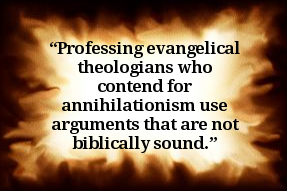The Pastor Who Didn't Believe In Hell
Body
Discussion
Hell: universalists and annihilationists find common cause?
Body
Discussion
Southern Baptists Affirm Resolution Rejecting Rob Bell’s View on Hell
Body
Discussion
Rob Bell Denies Being a Universalist
Body
Discussion
Is Hell Forever? Evangelicals and Eternal Retribution
 Reprinted with permission from Voice, Sept./Oct, 2001. By Dr. James R. Mook.
Reprinted with permission from Voice, Sept./Oct, 2001. By Dr. James R. Mook.
Will the destiny of the unsaved be eternal conscious torment or annihilation (total cessation of existence)? The eternal conscious punishment of the lost has always been a fundamental doctrine of Christian orthodoxy. Tertullian, Augustine, Luther, Calvin, Wesley, Edwards, Pieper, Berkhof, Shedd, Chafer, Erickson, and other theologians affirmed the doctrine of eternal conscious punishment as a biblical essential-explicitly defining divine eternal “punishment” against “annihilation.” (Robert A. Peterson, Hell on Trial: The Case for Eternal Punishment, Presbyterian & Reformed Publishing Co., 1995, pp. 97-137.)
But in recent years some prominent professing evangelicals have advocated conditional annihilationism (which includes the concept of postmortem evangelizing of those who die without having heard the gospel).
Examples: Philip E. Hughes, Clark H. Pinnock, John R. W. Stott, and John W. Wenham.
Discussion
The Hope of Hell? Justice is Being Served
 The following was written by pastor Charles J. Colton and is reprinted from Baptist Bulletin, November, 2007. It appears here unedited.
The following was written by pastor Charles J. Colton and is reprinted from Baptist Bulletin, November, 2007. It appears here unedited.
While some “cultural” Christians and others recoil at any notion of divine wrath—after all, God is love—the more Biblically literate understand the proper place of God’s retributive justice in the grand scheme of things. Most Christians understand how a doctrine of divine retribution serves as a warning to those who are unsaved, but it would appear that a far fewer number comprehend that the idea of divine retribution—which encompasses, among other things, a belief in Hell— affords the believer with considerable hope and comfort. At the very least, they seem unwilling to express that understanding.
Ordinary people want to know
Perhaps their silence reflects due caution. After all, what critic hasn’t already asked a thousand times, “How could a loving God have created a place called Hell?” Perhaps a reluctance to talk of Hell in any way that might be misconstrued as a bit gleeful is well considered. In my own experience, however, away from the “ivory towers” in which the critics ply their trade, ordinary people are asking just the opposite question: “Why does a loving God take so long to bring justice to hurting people?”
It may be that the events of September 11, 2001, have caused the majority of Americans to reconsider for themselves which is the more important question to ask. After all, what civilized person did not cry out to God for justice on that day, when a band of Islamist terrorists brutally murdered about three thousand people in Lower Manhattan, rural Pennsylvania, and Washington, D.C.? If there were calls for understanding toward the perpetrators, they were understandably drowned out.

Discussion